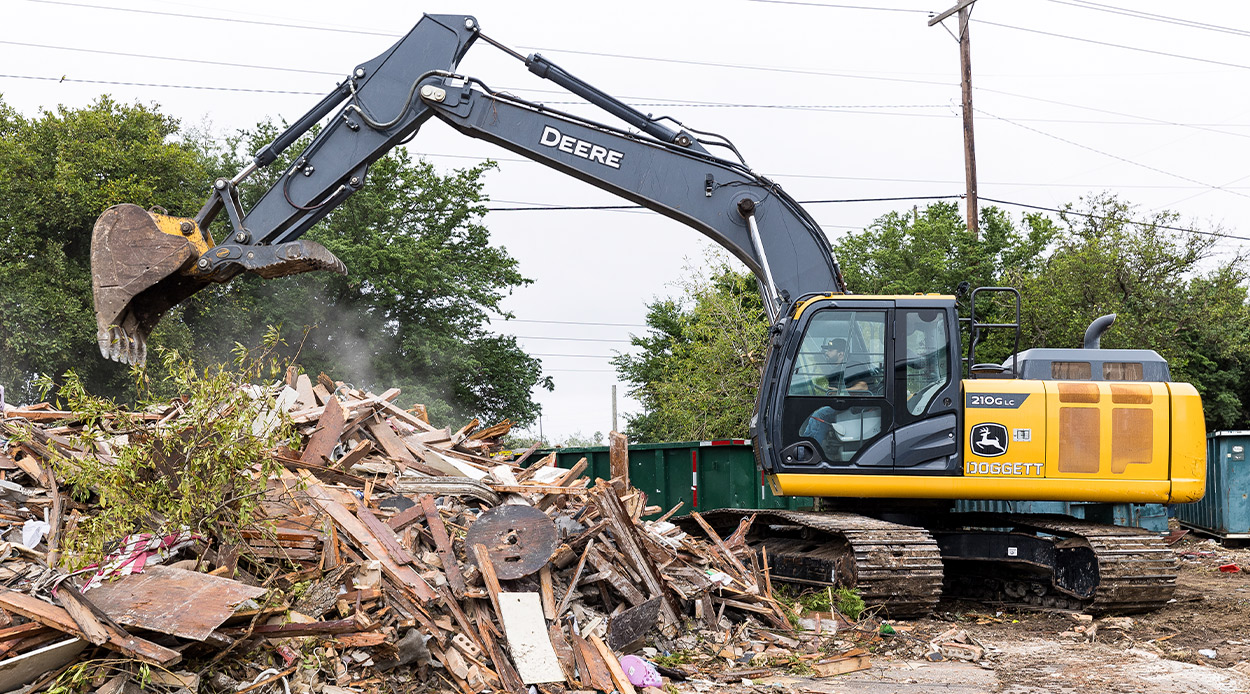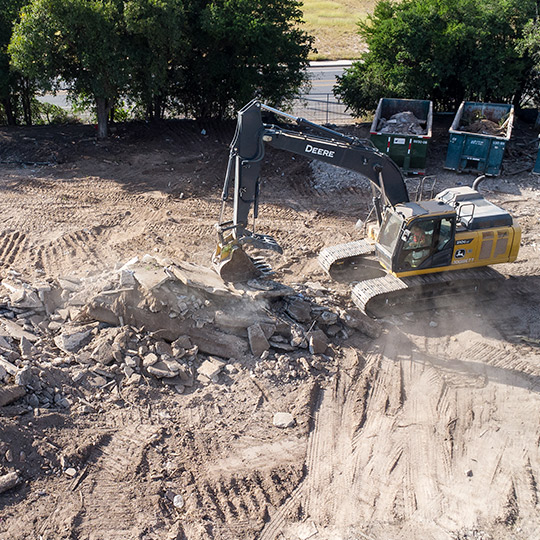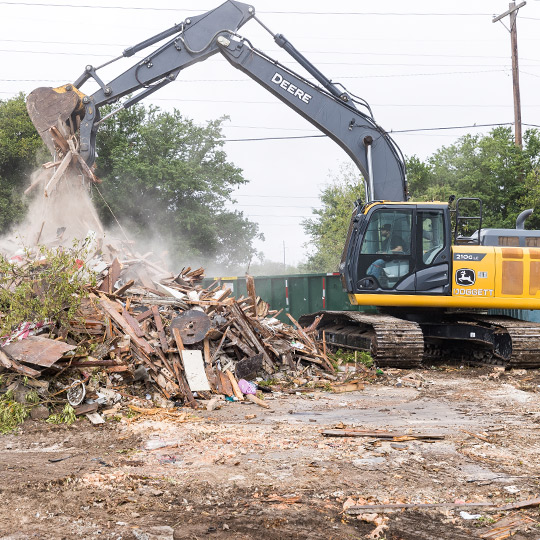
Demolishing a house can feel like the end of one chapter and the exciting beginning of another. But when planning a house tear down, make sure you know how much it will cost – And look for experts to help – Because the process can be more intricate that you expect. Here is a look at how the costs can break down.
How much does it cost to tear down a house? A National Comparison
According to HomeGuide, demolishing a house costs between $14,000 to $19,000, or $4 to $10 per square foot, depending on factors like size, materials, and local regulations. Costs can skyrocket to $25 per square foot if hazardous materials like asbestos are found.
In McAllen, Texas, expect costs to range from $10,000 to $18,000 for a standard 1,500 sq. ft. home. This is slightly lower than urban hotspots like Los Angeles, where similar projects often exceed $25,000 due to stricter regulations and labor costs.
The Process of House Demolition
House demolition is a carefully planned process involving several stages to ensure safety, compliance, and efficiency.
| Cost Component | Typical Range* |
| Permits | $100 – $500 |
| Utility Disconnection | $600 – $3,800 |
| Labor | $4 – $10 per sq. ft. |
| Debris Removal | $1,500 – $3,000 |
| Hazardous Material Removal (asbestos/lead) | $5 – $20 per sq. ft. |
| Site Preparation and Cleanup | $300 – $1,800 |
*Data sourced from HomeAdvisor
1. Permits and Inspections

Obtaining permits and completing inspections is the first step. Homeowners submit plans and pay fees ranging from $100 to $500. Local authorities often require environmental assessments, especially for older homes that may contain asbestos or lead paint. Inspections ensure the site meets all safety standards before work begins.
2. Utility Disconnection
Utilities such as water, gas, electricity, and sewer lines must be safely disconnected to prevent accidents during demolition. This process costs between $600 and $3,800. Coordination with utility providers is essential to ensure a smooth, compliant disconnection.
3. Salvaging Materials
Before heavy machinery arrives, contractors remove salvageable materials such as windows, doors, and fixtures for reuse or donation, which may provide tax benefits. Salvaging not only reduces landfill waste but can also lower overall project costs.
4. Demolition Phase
The actual teardown involves using heavy machinery such as excavators, bulldozers, and wrecking balls. This phase generally lasts two to five days, depending on the home’s size and complexity. Deconstruction, an eco-friendly option, takes longer but allows for more materials to be reused.
5. Debris Removal and Site Cleanup
Once the structure is down, debris is hauled away. This can cost between $1,500 and $3,000, with dumpster rentals adding $300 to $700 per week. Proper disposal ensures hazardous materials are safely handled and recyclable materials are processed appropriately.
6. Site Grading
The final step is grading the land to ensure it is level and ready for future construction. This process costs between $1,000 and $3,000 and is vital for proper drainage and a stable foundation for the next project.
Factors That Affect Demolition Costs

The exact demolition cost is dependent on various factors, including:
- House size and complexity: Larger structures require more labor and equipment, increasing costs. Multi-story homes are costlier due to increased demolition time and debris volume.
- Location and accessibility: Urban areas, such as Los Angeles, have higher labor and disposal fees, while McAllen offers relatively lower costs due to local regulations and labor rates.
- Building materials: Wooden structures are cheaper to demolish than concrete or brick due to easier breakdown and removal.
- Hazardous materials: The presence of asbestos, lead paint, or mold requires specialized handling and disposal, often costing $5 to $20 per sq. ft.
- Permits and regulations: Permit fees can range from $100 to $500, depending on local codes and environmental requirements.
- Seasonal impact: Costs may rise during peak construction seasons due to higher demand for labor and equipment.
- Salvage opportunities: Deconstruction can reduce net costs by selling or donating reusable materials.
Types of Demolition and Their Costs
The demolition costs also depend on the extent of demolition. Here is a rough estimate of the involved costs:
- Full demolition: $4 – $10 per sq. ft. (common for complete rebuilds)
Ideal for clearing the entire property for new construction. Time-efficient but generates significant debris.
- Partial demolition: $5,000 – $15,000 (for remodels)
Common for removing sections of a house while retaining its core structure. Costs depend on scope and complexity.
- Deconstruction: $8 – $16 per sq. ft. (eco-friendly but labor-intensive)
Materials like wood, brick, and fixtures are carefully salvaged for reuse or donation. Although costly upfront, potential tax benefits from salvaged donations can offset costs.
- Selective demolition: Costs vary by project.
Focuses on removing specific areas, such as a kitchen or a roof, without disturbing the rest of the structure.
- Interior demolition: $1,000 – $10,000
Common for remodeling projects where only the inside is gutted while the exterior remains intact.
House Demolition Cost Comparison: McAllen vs. Other Areas
House demolition costs vary significantly by location due to differences in labor rates, permit fees, and disposal costs.
| Location | Estimated Cost Range for 1,500 sq. ft. Home |
| McAllen, TX | $10,000 – $18,000 |
| Dallas, TX | $12,000 – $20,000 |
| Los Angeles, CA | $20,000 – $25,000+ |
| Chicago, IL | $15,000 – $22,000 |
In McAllen, Texas, the estimated cost for a 1,500 sq. ft. home ranges from $10,000 to $18,000. This is partly due to lower labor costs and more affordable permit fees compared to larger metropolitan areas. Dallas, Texas, has slightly higher costs, averaging $12,000 to $20,000, primarily because of stricter regulations and higher disposal fees.
In Los Angeles, California, the same demolition can easily exceed $25,000 due to high labor rates, extensive permit requirements, and expensive debris disposal. Chicago, Illinois, falls between these extremes, with typical costs ranging from $15,000 to $22,000, driven by local labor rates and disposal fees.
These regional differences highlight the importance of obtaining multiple local quotes and understanding area-specific costs before starting a demolition project.
Additional Factors Impacting Demolition Costs

House demolition often comes with expenses beyond the primary teardown, and understanding these costs upfront can prevent budget overruns.
- Hazardous material removal: If asbestos or lead paint is found, specialized removal is necessary. Asbestos abatement averages $5 to $20 per square foot, while lead paint removal costs $8 to $15 per square foot. Mold remediation may also be required, adding thousands to the overall budget.
- Environmental impact fees: Local governments may charge environmental fees to manage landfill use and ensure proper hazardous waste disposal. These fees typically range from $50 to $500, depending on local regulations and the volume of debris.
- Temporary housing and storage: If the demolition is part of a rebuild, homeowners may need temporary accommodations. Rental costs can add thousands, and storage fees for personal belongings can range from $100 to $300 per month.
- Permit extensions and inspections: Unexpected delays may require additional permits or re-inspections, adding $100 to $500 in fees. Delays could also extend rental periods for dumpsters and machinery, increasing costs further.
- Insurance and liability protection: Contractors should carry liability insurance, but homeowners may need additional coverage for potential property damage. Depending on the project size, extra coverage can cost from $500 to $2,000.
- Site restoration costs: After demolition, additional expenses may include removing old foundations or contaminated soil, which can cost between $1,000 and $5,000, depending on the site’s condition.
Tips to Reduce Demolition Costs

1. Get Multiple Quotes and Compare Services
Gather several estimates from licensed construction contractors. Competitive bidding can lower costs, and detailed quotes help ensure you’re comparing similar services.
2. Salvage Reusable Materials
Remove and sell or donate items like doors, fixtures, and wood. This reduces waste and can offer tax benefits from donations.
3. DIY Small Tasks
Handle minor work yourself, such as removing appliances, deconstructing sheds, or sorting debris. This cuts labor costs without compromising safety.
4. Recycle Debris to Reduce Disposal Fees
Separate recyclable materials like metal, concrete, and wood. Some recycling centers accept these for free or even pay for valuable scrap.
5. Schedule Demolition During Off-Peak Seasons
Plan your project for late fall or winter when demand is lower. Contractors are often more willing to negotiate rates during slower months.
6. Consolidate Projects to Save on Equipment Rentals
Combine demolition with other construction work to share equipment and reduce rental fees.
7. Verify What the Contractor’s Quote Includes
Review estimates carefully to ensure services such as debris hauling and site grading are included, avoiding surprise costs later.
Embrace New Beginnings With Liongate Builders
Demolishing a house is more than just breaking walls—it’s about making informed decisions. With clear cost expectations and the right contractor, you’ll be on your way to a fresh start.
Whether you’re building your dream custom home or clearing space for something new, Liongate Builders is here to help you budget wisely and avoid surprises. Contact us today to get started.


